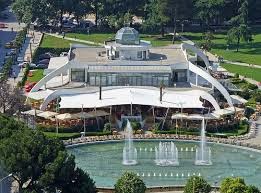Located in Southeastern Europe, Albania is a country off of
the beaten travel road. Of course, this makes Albania a great place to visit.
Albania – History
Albania is a Mediterranean country sitting on the coast of
the Adriatic and Ionian seas. The country is bordered to the north by Serbia
and Montenegro, Greece to the south and Macedonia to the east. Involved in the
massive strife arising in the former Yugoslavia, the country was previously a
Soviet-Bloc country. These days, Albania is a democracy fighting to find its
economic feet. This paragraph is sponsored
by travel to Harare from UK.
Tirana
Tirana is the capital of Albania and has a population of a
little over 300,000. The city is an eclectic mix of traditional European
structures, soviet style five story buildings and mid-east influenced
architecture. Relatively small, Tirana is a city with a small town feel.
Korca – Rugs, Rugs,
Rugs
Korca is a city located in the east of Albania close to the
border of Greece. Built high up on a plateau, Korca is a must see if you love
Turkish style rugs and carpets. The entire city seems to be devoted to the
manufacture and sale of every size, color and type of rug. If you’re staying
overnight, Hotel Illyria is your best option.
Petrela Castle
Dating back to 500 AD, Petrela Castle is an ancient
structure, which is in relatively good shape considering the history attached
to it. At one time or another, Petrela was the primary defense of the city of
Durres. It has been held, used and conquered by Romans, Greeks, Turks and
other. Seriously off the beaten path, getting to Petrela requires a sturdy Jeep
or Land cruiser. It is a very bumpy road, but the view is more than worth
it. This paragraph is sponsored by Harare guide tour from
London.
While Albania is struggling to recover from a communist
pass, it is a fairly safe place to visit. The people are nice and it is
definitely an opportunity to visit a country off the beaten path.









The People's Socialist Republic of Albania is a country lying on the Adriatic Sea in the European continent. Most of the country is either mountainous or swampy. It is fast developing its rich mineral resources, hydroelectric potential, and manufacturing, but farming remains the major occupation. After more than four centuries of Turkish rule, Albania proclaimed its independence in 1912, and that independence was guaranteed by the Allied powers after World War I. The country became a republic in 1925. In 1944 the Communist party gained control, and Albania became a satellite of the USSR. It declared itself the first atheist state, abolishing all public worship in 1967. In 1961 it broke with the Soviets and in 1968 withdrew from the Warsaw Pact after the Soviet intervention in Czechoslovakia. Between 1961 and 1976, its closest links were with China.
ReplyDelete